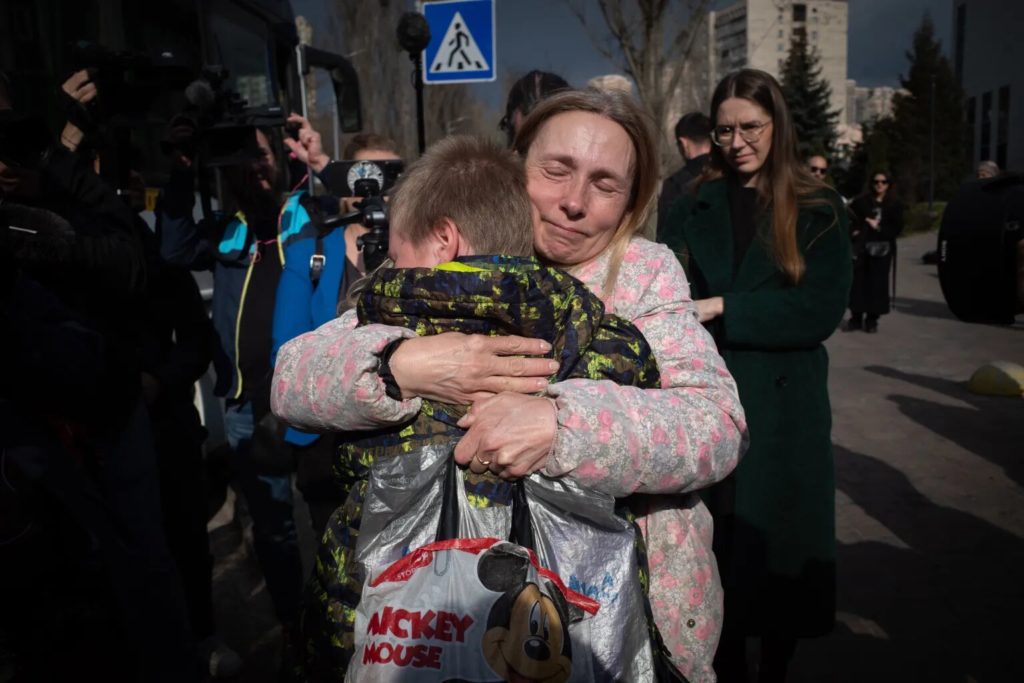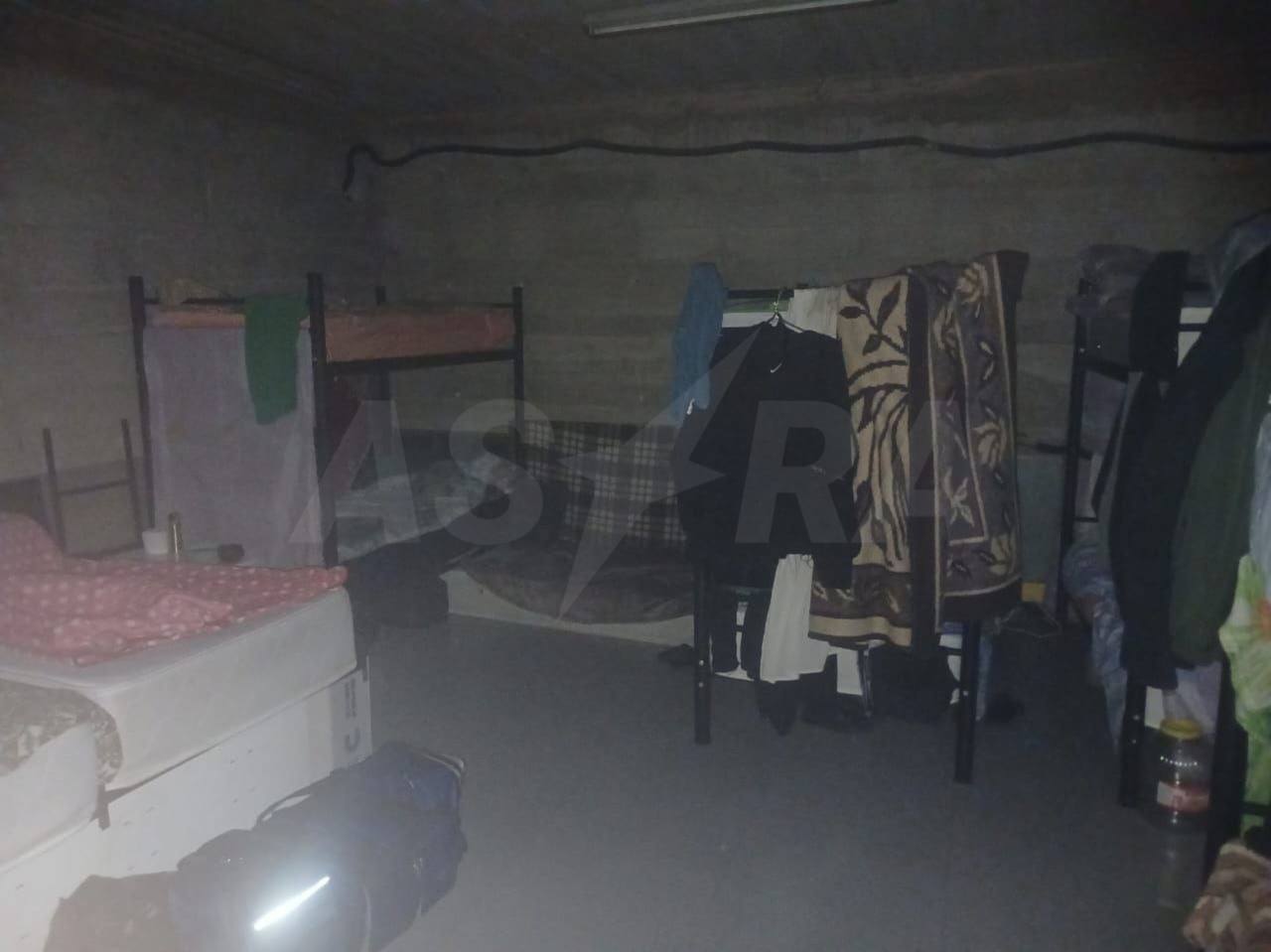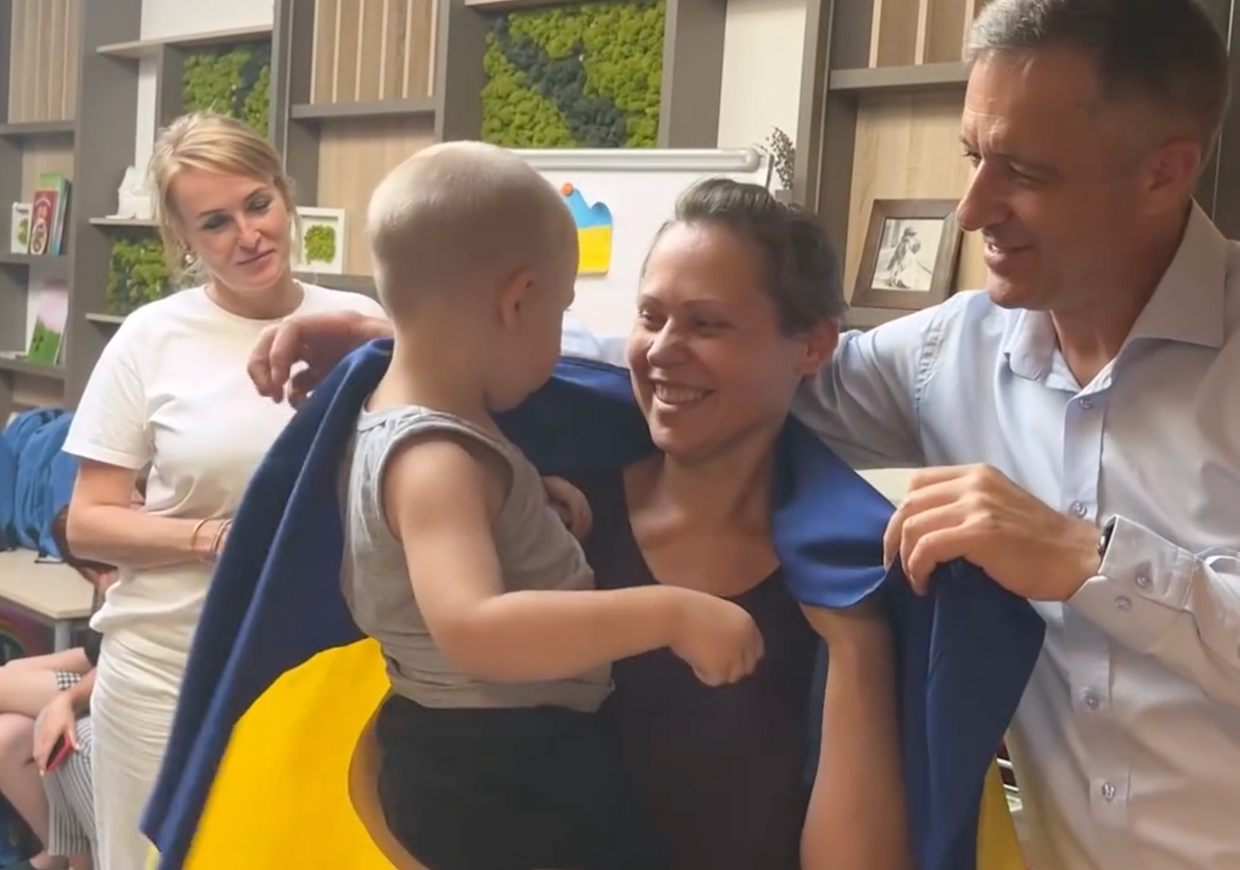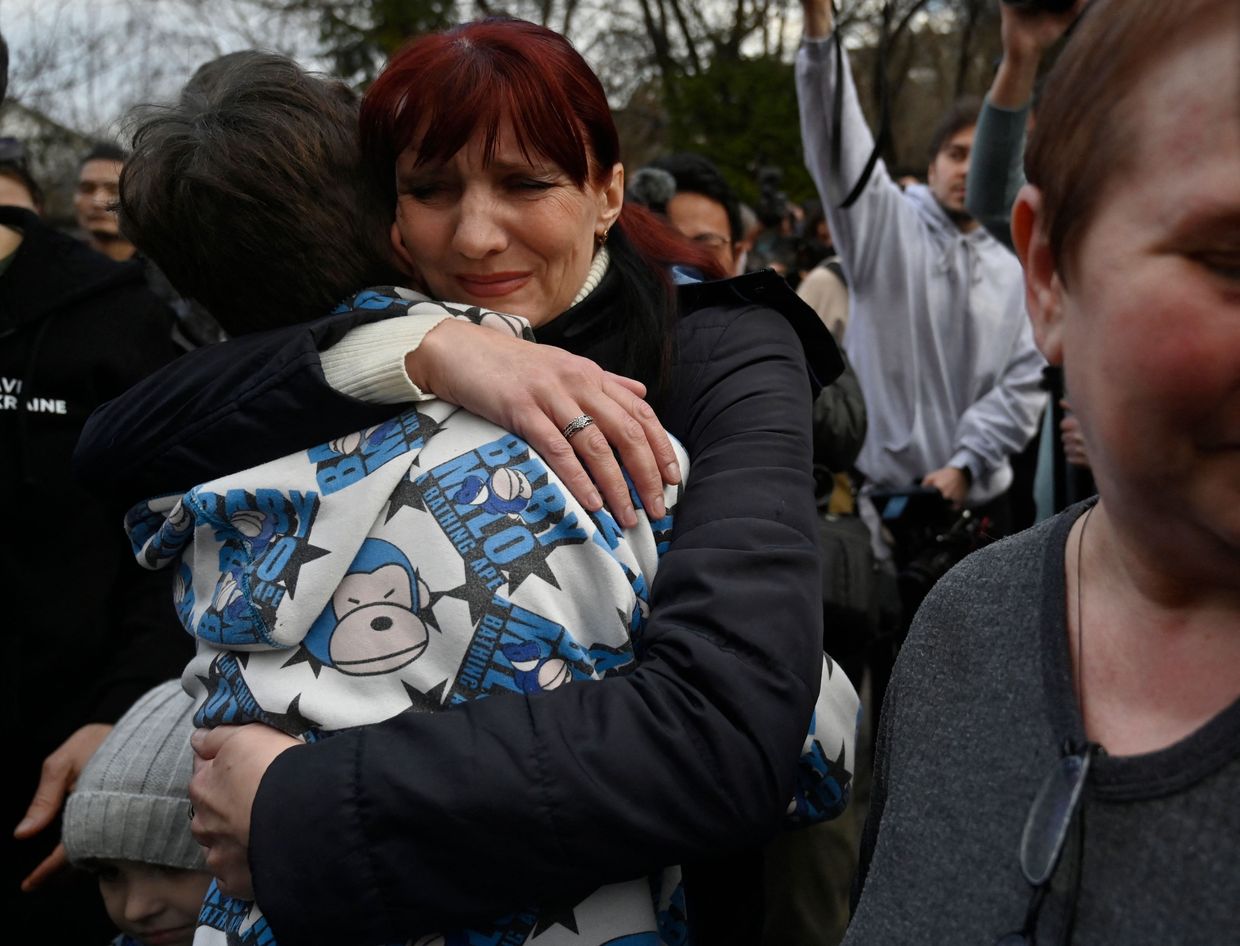Catholic Bishops Rebuke Trump’s Immigration Tactics in Rare Statement

© Stephanie Scarbrough/Associated Press


© Stephanie Scarbrough/Associated Press


Ukraine announced the return of a group of children and teenagers from Russian-occupied territories through the Bring Kids Back UA initiative, according to Presidential Office head Andriy Yermak.
The returns underscore the ongoing challenge of recovering Ukrainian children from Russia's systematic deportation campaign. Since February 2022, Russia has deported 19,546 Ukrainian children according to the Children of War portal, with only 1,791 returned as of 12 November 2025—a war crime for which the International Criminal Court issued arrest warrants against Russian President Vladimir Putin and children's rights commissioner Maria Lvova-Belova in March 2023.
Among those returned was a 10-year-old girl whose classmates bullied her for her Ukrainian heritage, Yermak stated on Telegram. Her younger brothers at kindergarten were forced to sing Russian songs and collect money for the occupying army.
A 7-year-old girl and her 2-year-old brother lost their mother due to Russian doctors' inaction. Occupation authorities attempted to send the siblings to an orphanage despite having living relatives in Ukraine.
Another young person returned, now 19, had endured torture and execution threats from Russian military personnel because a relative served in Ukraine's Armed Forces. After reaching adulthood, occupation authorities placed him on the military registry.
Recent investigations reveal Russia systematically channels deported Ukrainian children through cadet schools and military training programs. The militarization campaign targets children as young as eight, subjecting them to years of pro-Russian indoctrination before conscripting them into occupation forces.
The returns come as Russia uses deported Ukrainian children as bargaining chips with Washington, according to the Institute for the Study of War. Russian officials frame limited returns as goodwill gestures toward the United States while continuing mass deportations.
Ukrainian President Volodymyr Zelenskyy recently highlighted the Bring Kids Back UA initiative as the primary channel for facilitating children's returns. An international coalition of 41 countries now works to support these efforts.
"We are fulfilling the president's task—to return all Ukrainian children," Yermak said on his Telegram, thanking Save Ukraine, the Security Service of Ukraine's Joint Center, and international partners.
Read more:
Russia sees deported Ukrainian children as bargaining chips with Washington - ISW
US senators seek to question Russian ambassador on more than 19,000 abducted Ukrainian children


Mykola Sedykh and Stas Balytskyi were eight years old when Russian occupation began in Donetsk Oblast. Now, they wear Russian military uniforms after years in cadet schools—victims of war crimes who may return to Ukraine as occupiers.
Ukraine faces a generation gap Russia engineered through decade-long indoctrination campaigns. Since 2014, Moscow has deported children from Donetsk Oblast orphanages and shelters, subjected them to years of pro-Russian propaganda in cadet schools, and channeled them into military service once they reach conscription age, according to an investigation by Ukrainian online newspaper Texty. The two young men now of legal age—Mykola Sedykh and Stas Balytskyi—exemplify how children removed from Ukrainian institutions become part of Russia's occupation forces, potentially returning to fight against their homeland.

Eight-year-old Mykola Sedykh spent four years in a Khartyzsk shelter between 2015 and 2019, where Russian paramilitaries from the "Pyatnashka" brigade regularly visited, bringing gifts and displaying weapons, Texty found. For children without parental protection, these armed men became heroes rather than invaders. The International Committee of the Red Cross recently clarified that propaganda aimed at encouraging children from occupied territories to voluntarily join enemy military service constitutes a war crime, even when presented as voluntary recruitment.
Stas Balytskyi's trajectory followed similar patterns. After losing both parents during the war, Russian propaganda outlets exploited his image for "Save Donbas Children" campaigns targeting European audiences, using orphaned children to justify Moscow's 2014 invasion while simultaneously preparing those same children for future combat roles.

Both boys ended up at Donetsk Boarding School No. 1, which deported 225 children to Russia on 18 February 2022, six days before the full-scale invasion. Director Olha Volkova, decorated with medals by occupation authorities, oversaw militarization programs including Yunarmia youth army participation before.
The institution has since transformed into a militarized cadet school named after Russian cosmonaut Georgiy Beregovoy, enrolling approximately 180 Ukrainian children starting from first grade, with a Russian citizen and war participant serving as military director.
Sedykh and Balytskyi were separated into different Cossack cadet schools—Sedykh to Kropotkin in Krasnodar Krai, Balytskyi to Ruza in Moscow Oblast, Texty reported. These facilities function as military boarding schools with weapons training, parade drills, and mandatory meetings with war veterans. Sedykh's school honors Russian General Gennadiy Troshev, who advocated public executions of Chechen resistance fighters during the 1990s conflicts.
Recent photos show both young men in Russian military uniforms. Balytskyi now attends Moscow Higher Military Command School training motorized rifle commanders and military police, while Sedykh appears to have joined a Kuban Cossack military formation, likely one of the BARS units currently fighting in Zaporizhzhia, Kherson, and Donetsk oblasts.
Russia's Kuban Cossack forces deployed more than 9,200 personnel in Ukraine as of 2025. Ukrainian citizen Mykola Sedykh may soon return to Donbas—but as Nikolay (the Russian version of his name), an occupation soldier potentially fighting against his own country.
The International Criminal Court issued arrest warrants for Vladimir Putin and Maria Lvova-Belova in March 2023 for illegal child deportation. Ukraine searches for nearly 20,000 deported children, though Russia's children's rights commissioner claimed receiving over 700,000 Ukrainian minors.


© Doug Mills/The New York Times


© Doug Mills/The New York Times


© Tierney L. Cross/The New York Times


© Tierney L. Cross/The New York Times


© Sue Ogrocki/Associated Press


© The New York Times


© Federico Rios for The New York Times


© Andrew Harnik/Getty Images


© Ivor Prickett for The New York Times


© Anna Rose Layden for The New York Times


© Alisha Jucevic for The New York Times


Russia is committing crimes against humanity in Ukraine, according to independent UN human rights investigators. Moscow is carrying out systematic, coordinated actions aimed at driving Ukrainians from their homes.
Russian President Vladimir Putin has moved from a strategy of conquering Ukraine to a strategy of its destruction. This year, he has lost hundreds of thousands of soldiers in exchange for less than 1% of Ukraine’s territory.
In its report on the situation in Ukraine, the UN Commission of Inquiry states that Russian forces have committed two crimes against humanity: "firstly, of 'murder and of forcible transfer of population' and secondly, 'deportations and transfers of civilians' from areas occupied by Russian forces, some of whom were tortured."
The report highlights that attacks stretching over 300 kilometers along the right bank of the Dnipro River — across the Dnipropetrovsk, Kherson, and Mykolaiv oblasts — represent a coordinated campaign to force Ukrainians from their homes.
Russian forces have deliberately targeted:
“We are hit every day, drones fly at any time - morning, evening, day or night, constantly,” said a man interviewed for the report.
The UN-appointed investigative commission, established in March 2022 by the Human Rights Council, gathered testimonies from residents living under bombardment who described their conditions as “unbearable.”
The findings are based on approximately 500 verified videos of crimes, with 247 geolocated incidents, and 226 interviews with Ukrainian citizens.
The report also documents detentions, torture, and the confiscation of documents and property — actions that "inflicted severe mental pain and suffering and amount to inhuman treatment as a war crime and a violation of human rights."
Many attacks repeatedly struck the same vehicles and infrastructure, intentionally setting them ablaze and spreading terror among civilians, violating their fundamental rights.
The commission also reviewed Russia’s claims about Ukrainian drone strikes on civilian targets in occupied territories but said it could not draw conclusions due to a lack of access, security concerns for witnesses, and non-cooperation from Russian authorities.


Seventeen children have been returned to Ukraine from occupied territories, the Bring Kids Back UA initiative reports. Among them are minors who faced forced military training, threats from occupation authorities, and bullying in Russian schools.
One of the returnees is 17-year-old Mykyta, whom occupation authorities forced into a "military camp" near Melitopol. His parents could not object because officials threatened to withhold his school certificate without a camp completion document.
The teenager spent five days in army-like conditions: wake-up at 6 am, formation drills, timed trench-digging, assembling assault rifles and drones, and building assault exercises.
Another 17-year-old returnee, Rostyslav, has relatives serving in the Ukrainian army. Occupation forces came to his family's home immediately after capturing the village. During a search, Russian military personnel confiscated all the boy's devices and took him to a police station for several hours.
After that, soldiers repeatedly came to their home, intimidating and threatening him and his mother.
Seven-year-old Yaroslav, who lived with his grandparents on the right bank of Kherson Oblast for three years, has now reached government-controlled territory. His parents left for Kherson when the city was not yet occupied but could not return—the bridge was blown up and the crossing closed. Since then, the family has been on opposite sides of the front line.
Relatives hid the boy from occupation forces and even obtained Russian documents to avoid suspicion. When they learned that occupation authorities were planning to "remove" the child, they decided to flee.
The initiative also returned 12-year-old Sonia and 9-year-old Tymofiy, who were afraid to attend Russian schools. A classmate said directly about the girl: "She should be killed because she is from Ukraine."
Tymofiy was constantly insulted and forced to listen to anti-Ukrainian songs. As soon as an opportunity arose, the family left the occupation.
All rescued children are now safe and receiving psychological support, help with documents, and shelter.
Earlier, a 23-year-old mother with an infant was returned from temporarily occupied territory. She lived in constant fear for a year and hid at home to avoid losing her child.


© Denis Charlet/Agence France-Presse — Getty Images


© Jason Andrew for The New York Times


Over 45 Ukrainians forcibly deported by Russia from Ukraine's occupied territories are being held in a basement at Russia's border with Georgia without food, water, and basic healthcare, independent media outlet Astra reported on June 21.
"We are in a basement without utilities: there is no shower or toilet, they don't feed us. Volunteers bring humanitarian aid, but it lasts for a couple of days and not for everyone," one of the held Ukrainians told Astra.
A decree by Russian President Vladimir Putin has ordered Ukrainians still living in occupied territories to leave unless they "regulate their legal status," namely, obtaining Russian citizenship.
"We emphasize that these systematic deportations and persecutions are part of Russia's genocide policy against the Ukrainian people," Foreign Ministry spokesperson Heorhii Tykhyi said on March 21.
At least 45 Ukrainians have been held at the Verkhniy Lars border checkpoint between Georgia and Russia for several days.
One of the deported Ukrainians has been hospitalized as they await passage out of Russia and into Georgia.
"There were 8 of us, 3 days ago. Every day, more people are brought here and the number is growing. Now there are 45 people, some have been here for a month. There are disabled people and people with serious illnesses," one of the held Ukrainians said.
The basement facility has since 2023 held deported Ukrainians barred from entering the Russian Federation and the Ukrainian territories it occupies.
The held Ukrainians were denied entry into Georgia. Most did not have the necessary travel documents, but 16 Ukrainians with passports were denied entry as well, Astra reported, citing the non-profit organization Tbilisi Volunteers Organization.
"The basement is damp, there are drops of water on the ceiling, (it's hard) to breathe, everyone smokes, they don't let us outside. We sleep for four hours, taking turns. Some sleep on the floor," one of the deported Ukrainians said.
The basement only houses 17 sleeping spaces, but another 100 deported Ukrainians are expected to arrive at the facility, a volunteer told Astra.
Following a pause in deportations to Georgia in 2024, Russia has resumed deportations as Georgia prepares new immigration legislation, the Tbilisi Volunteers Organization says.
Serhiy Serdiuk, a resident of occupied Zaporizhzhia Oblast, was deported and banned from re-entering Russia and Ukraine's occupied territories for 40 years, the Guardian reported on June 21.
Russian authorities pressed Serdiuk, an educator, to continue work under Russia's imposed school curriculum.
Serdiuk and other staff at a school in Zaporizhzhia Oblast's Komysh-Zoria town refused and were met with threats.
Serdiuk was similarly deported to Georgia, from where he flew to Moldova and crossed back into Ukraine.
Due to Russia's illegal and unrecognized annexation of Ukraine's occupied territories, Ukrainian citizens are pressured to obtain Russian citizenship or face deportation and entry bans.
 The Kyiv IndependentLinda Hourani
The Kyiv IndependentLinda Hourani


The lower house of the Dutch parliament on June 19 officially recognized the 1944 mass deportation of Crimean Tatars by the Soviet Union as genocide, according to a statement from the parliamentary press service.
The motion cited precedent from other countries that have recognized the forced deportations as genocide, including Poland, the Czech Republic, Canada, Latvia, Lithuania, and Ukraine.
In the adopted text, Dutch lawmakers declared that the Soviet-led deportation of Crimean Tatars, which took place between May 18 and 21, 1944, constitutes genocide by contemporary legal and historical definitions.
The 1944 deportation was carried out under direct orders from Soviet dictator Joseph Stalin, who labeled the entire Crimean Tatar population as traitors following the peninsula's liberation from Nazi occupation.
Over 190,000 Tatars were forcibly removed from Crimea in a matter of days, though some estimates place the number closer to 430,000, and sent to remote areas in Central Asia, mainly Uzbekistan, in brutal conditions that led to mass deaths.
The document pointed to the ongoing repression of Crimean Tatars under Russian occupation since 2014. It said that "many Crimean Tatars have been unjustly imprisoned, subjected to torture by the Russian Federation, or forcibly disappeared," and added that "Russia has likely continued a policy of genocide against Crimean Tatars."
Foreign Minister Andrii Sybiha welcomed the decision, calling it "a powerful gesture of solidarity with the Crimean Tatar people, who are still facing persecution under Russia’s temporary occupation of the Ukrainian Crimea peninsula."
Sybiha noted that the Netherlands is now the seventh country to formally recognize the deportation as genocide and urged other nations to follow suit.
"Recognizing this historical injustice is critical not only for establishing truth and justice, but also for preventing future atrocities," the minister wrote.
Ukraine's parliament recognized the deportation as genocide in 2015 and established May 18 as the official Day of Remembrance for the Victims of the Genocide of the Crimean Tatar People.
 The Kyiv IndependentAnastasiia Lapatina
The Kyiv IndependentAnastasiia Lapatina


Ukraine successfully brought back five children who had been forcibly taken to Russia as well as Russian-occupied territory, Presidential Office head Andriy Yermak announced on June 12.
The children have been returned home under the President of Ukraine’s initiative, Bring Kids Back UA, according to Yermak.
"We are fulfilling the President's mission — to bring back every Ukrainian child," Yermak said in an statement.
Since February 2022, at least 20,000 Ukrainian children have been abducted from Russian-occupied territories and sent to other Russian-controlled areas of Ukraine or to Russia itself, according to a Ukrainian national database, "Children of War." Only 1,359 children have been returned thus far.
Dmytro Lubinets, Ukrainian Parliament’s Commissioner for Human Rights, estimated that Russia has unlawfully deported up to 150,000 Ukrainian children, while the Children’s Ombudswoman, Daria Herasymchuk, puts the figure at 200,000–300,000.
In March 2023, the International Criminal Court (ICC) issued arrest warrants for Russian President Vladimir Putin and Children's Commissioner Maria Lvova-Belova, citing their involvement in the unlawful transfer of Ukrainian children. Russia dismissed the ICC's decision as "outrageous and unacceptable."
Under orders from Putin, children were transported via military aircraft in 2022, reclassified in Russian databases as native-born, and subjected to pro-Russian re-education before being adopted into Russian families. Ukrainian children had been transported to at least 21 regions throughout Russia.
Child abductions have played a key part of U.S.-Russia peace negotiations — all of which Russia has thus far rejected. Ukrainian officials have named their return as a key condition for any future peace agreement with Russia.
President Volodymyr Zelensky said on June 3 that during the Istanbul negotiations, Russian representatives dismissed the issue of abducted Ukrainian children as a "show for childless European old ladies" and acknowledged deporting several hundred children.
CNN reported on June 11 that the Yale University-based Humanitarian Research Lab, which spearheads the Ukraine Conflict Observatory is preparing to shut down after its funding was terminated by the Trump administration.
A Yale study published on Dec. 3 detailed Russia's systematic program of deporting and forcibly assimilating Ukrainian children.
 The Kyiv IndependentAnna Fratsyvir
The Kyiv IndependentAnna Fratsyvir